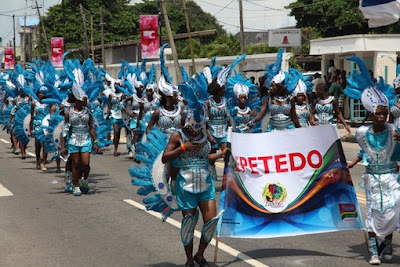See 10 Popular Places in Lagos and Their Original Names. Wow!
Someone
shared this info on Whatsapp and we feel its good we post it for
reference purpose. I was particularly surprised at the way some of the
names metamorphosed into what we call them today.
Check these out:
Ojota
Ojota used to be a military settlement in the late 18th century and soldiers practised their shooting there. The area had several gun firing spots and became known as “Oju Ota” in Yoruba which means “Bullet spots”. It later metamorphosed into Ojota which it is called now.
Abule Egba
This area is on the outskirts of Lagos and got its name from the early settlers who were Egba people from Abeokuta. The area was first called “Abule awon egba” in Yoruba, which means “Village of Egba people”. It later became “Abule Egba”.
Apongbon
Apongbon is one of Lagos’ most popular markets, and it’s also quite close to the popular Oke-Arin market. It got its name from the then acting governor of the Lagos colony, William McCoskry, who had a Red Beard. The Yorubas who couldn’t pronounce the colonial governor’s name decided to describe him by his red beard and started calling him “Oyinbo to pon ni igbon” meaning a red-bearded man. It later became Apongbon.
Magodo
Magodo is now a posh area, but in the past, it used to be sacred land. The residents had a lot of taboos and one of them was to avoid using mortars and pestles, “Ma gun odo” which means “Don’t pound it”. It later became ‘Magodo
Epetedo
Epe is named after the early settlers who were Epe traders. The area became dominated by the Epes and they still trade there until today.
Ebute-Metta
Ebute-Metta is one of the earliest harbour docks where British ships berthed at. It was a hub for trade and commerce in colonial times. Ebute-Metta is a fusion of the words “Ebute” which means the seaside in Yoruba, and “Metta” which means three.
Broad Street
Broad Street used to be one of the longest and widest streets in the city. It got its name from its broadness.
For more CLICK
Check these out:
Ojota
Ojota used to be a military settlement in the late 18th century and soldiers practised their shooting there. The area had several gun firing spots and became known as “Oju Ota” in Yoruba which means “Bullet spots”. It later metamorphosed into Ojota which it is called now.
Abule Egba
This area is on the outskirts of Lagos and got its name from the early settlers who were Egba people from Abeokuta. The area was first called “Abule awon egba” in Yoruba, which means “Village of Egba people”. It later became “Abule Egba”.
Apongbon
Apongbon is one of Lagos’ most popular markets, and it’s also quite close to the popular Oke-Arin market. It got its name from the then acting governor of the Lagos colony, William McCoskry, who had a Red Beard. The Yorubas who couldn’t pronounce the colonial governor’s name decided to describe him by his red beard and started calling him “Oyinbo to pon ni igbon” meaning a red-bearded man. It later became Apongbon.
Magodo
Magodo is now a posh area, but in the past, it used to be sacred land. The residents had a lot of taboos and one of them was to avoid using mortars and pestles, “Ma gun odo” which means “Don’t pound it”. It later became ‘Magodo
Epetedo
Epe is named after the early settlers who were Epe traders. The area became dominated by the Epes and they still trade there until today.
Ebute-Metta
Ebute-Metta is one of the earliest harbour docks where British ships berthed at. It was a hub for trade and commerce in colonial times. Ebute-Metta is a fusion of the words “Ebute” which means the seaside in Yoruba, and “Metta” which means three.
Broad Street
Broad Street used to be one of the longest and widest streets in the city. It got its name from its broadness.
For more CLICK


















Post a Comment